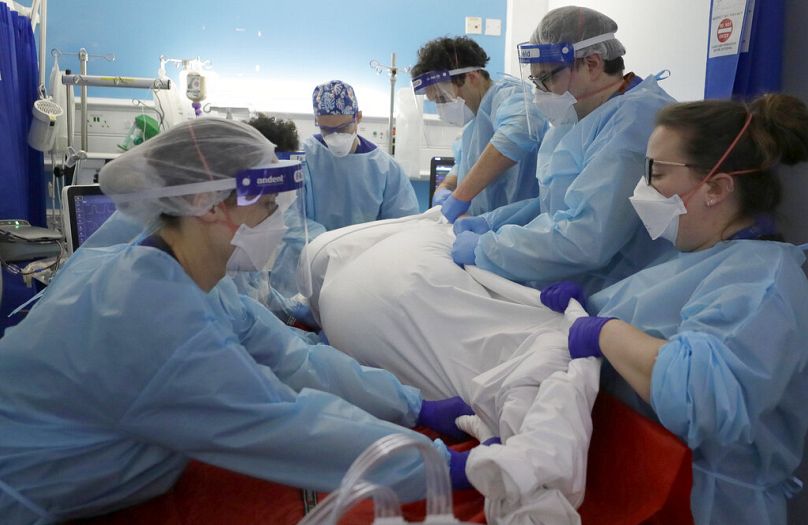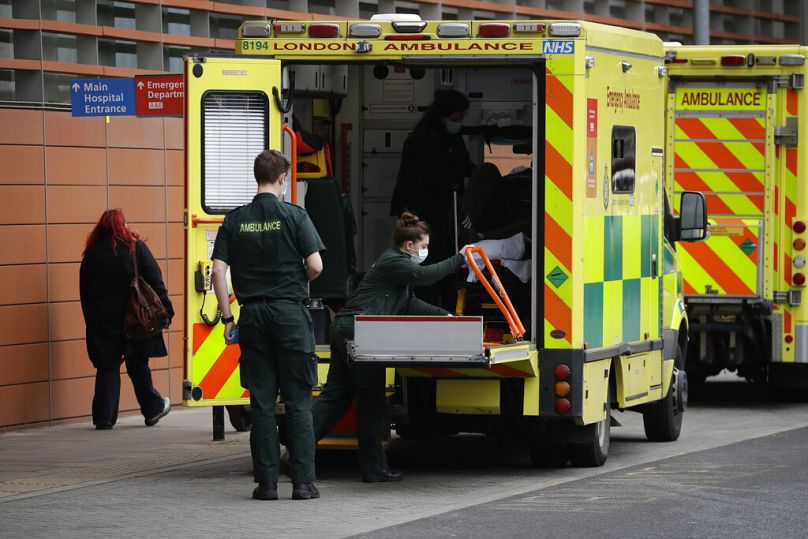Two teams of researchers in the UK found the new strain discovered in September 2020 has higher transmission rates but does not lead to more severe symptoms than the original.
The new strain of coronavirus first identified in England is more infectious but not more dangerous than the original COVID-19, two new UK-based studies have found.
The reports, published on Tuesday in The Lancet Infectious Diseases and The Lancet Public Health, found no evidence that it led to worse symptoms, increased death rates or made patients more likely to experience long COVID.
The variant, known as B.1.1.7, was identified in Kent in the south-east of England last September and became widespread by the end of the year.
It has been associated with the massive spike in COVID-19 cases recorded in the UK in January and has now been detected in more than 100 other countries worldwide.
The findings of both studies, which cover the period from September to December 2020, contrast with at least three others that tied the so-called Kent variant to higher mortality rates. The authors stressed the need for ongoing research into new COVID-19 variants as and when they emerge.
Infections with 'UK variant' higher in young people and ethnic minorities
The first report is a whole-genome sequencing study involving COVID-19 patients admitted to London’s UCL London Hospital and North Middlesex University Hospital between November 9 and December 20, 2020.
This was a critical point when both the original and B.1.1.7 variants were circulating in the capital, and before the UK’s mass vaccination programme had begun to gather steam.
The authors compared illness severity in 143 people with the original variant, and 198 infected with B.1.1.7, and calculated viral load: the amount of virus in an infected person’s blood.
They found no evidence of an association between the Kent variant and worse symptoms. In total, 36 per cent of B.1.1.7. patients became severely ill or died, compared to 38 per cent of those with a non-B.1.1.7 strain.
They did find that people infected with the variant tended to be younger, with 55 per cent of those infected aged under 60 compared to 40 per cent in the other cohort. Infections with the variant also occurred more frequently in ethnic minority groups, accounting for 50 per cent of cases compared with 29% for non-B.1.1.7 strains.
But the authors did find that the B.1.1.7 strain was likely to be more infectious. Samples collected by PCR tests from patients infected with the variant indicated higher amounts of virus in their noses and throats.
Researcher Dr Eleni Nastouli, from University College London Hospitals NHS Foundation Trust and the UCL Great Ormond Street Institute of Child Health, UK, said: “One of the strengths of our study is that it ran at the same time that B.1.1.7. was emerging and spreading throughout London and the south of England. Analysing the variant before the peak of hospital admissions, and any associated strains on the health service, gave us a crucial window of time.”
No evidence of different symptoms or reinfection rates
The second observational study used data logged by 36,920 UK users of a COVID-19 symptom self-reporting app, all of whom had tested positive between September 28 and December 27, 2020.
The authors combined their results and symptom reports with surveillance data from the COVID-19 UK Genetics Consortium and Public Health England.
For each week and in each UK region, the authors calculated the proportion of users who reported any of the 14 officially recognised COVID-19 symptoms.
This analysis found no significant links between the proportion of B.1.1.7 in each region and the type of symptoms people said they experienced, or in the number of people who reported having long COVID.
It also found no evidence that the reinfection rate – the proportion of people who tested positive for coronavirus before October 1, 2020, testing positive again more than 90 days later – was affected by the Kent variant.
But they did find that the new strain led to a slight increase in the R number: the average number of new people infected by a COVID-19 patient during their infectious period.
Dr Mark Graham, from King’s College London, said: “The wealth of data captured by the COVID Symptom Study app provided a unique opportunity to look for potential changes in symptoms and length of illness associated with the B.1.1.7. variant.
“Reassuringly, our findings suggest that, despite being more easily spread, the variant does not alter the type or duration of symptoms experienced and we believe current vaccines and public health measures are likely to remain effective against it.”
The current surge in COVID-19 infections across Europe has been widely attributed to the Kent variant. So far it has been detected in 27 European countries, with Denmark, Italy, Ireland, Germany, France, the Netherlands, Spain and Portugal thought to have been particularly badly afflicted by the new strain.













